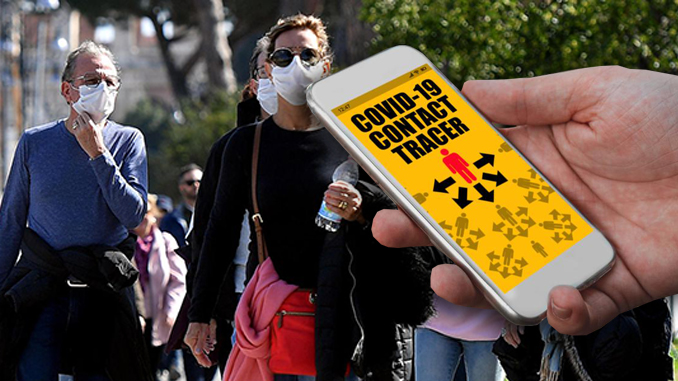
By Mark Anderson
“Contact tracing” is a technology whereby governments can electronically track and monitor individuals and those with whom a particular individual has been in contact. This tracking concept is being pushed as a way to justify safely reopening society amid the global Covid-19 shutdown. Many are concerned it could easily take on ominous dimensions that would make a mockery of privacy and expand eavesdropping on the public with a high degree of sophistication that advocates fail to mention.
 Two models of cellular device applications are on the verge of being rolled out for contact tracing purposes. One of these runs via an application program interface (API) developed by Apple and Google. The other is a more centralized approach that’s already being partially rolled out by a branch of the British National Health Service, called NHS-x.
Two models of cellular device applications are on the verge of being rolled out for contact tracing purposes. One of these runs via an application program interface (API) developed by Apple and Google. The other is a more centralized approach that’s already being partially rolled out by a branch of the British National Health Service, called NHS-x.
The Isle of Wight, according to The Guardian and other sources, is the UK’s pilot location to test the NHS-x approach. Road signs on that island say, “Isle of Wight Lead the Way. Download App Covid19.NHS.UK.”
“TLDR News,” a UK-based online news outlet, has posted a video to explain the way the two systems work. The Australian-based tech company Bluedot has also corroborated the Apple-Google system’s approach.
Suggesting that the Google-Apple approach might help induce mass compliance, Bluedot posed the question, “Will enough end-users opt in to contact tracing to make it reliable and effective?”
Regarding the more decentralized approach advocated by Google and Apple, TLDR notes, “[These] two companies controlling the software inside 98.92% of the worlds mobile phones” harness API to carry out contact tracing as follows:
Say “Dick” and “Jane” come into contact with one another. The Bluetooth wireless applications inside their phones share a unique identifying “key.” (That key automatically changes every 15 minutes as a built-in privacy measure.)
But, say that, a few days later, Dick finds out he has contracted the coronavirus. He then must go into the app and push the last 14 days’ worth of keys (representing his past contacts over the last two weeks) onto a server that has collected all of the keys of presumably infected people.
Jane’s cellular device regularly downloads data from its server and sees if any of the keys collected from nearby people match any of the keys on that infected-key database. So, when Dick pushes his keys to the server, Jane’s “device spots a match—at which point her server notifies her that someone she’s been in contact with is infected, [while] giving her advice from her local health authority.” This could include a mandatory 14-day quarantine, for instance.
A supposed upside to this “decentralized approach” is that the Bluetooth wireless app (a standard feature inside both iPhones and Androids that enables devices to communicate with one another and with various other external devices) negates the need for direct global positioning system (GPS) tracking of cellphone users.
There are concerns that “false positives” and other misleading information could prompt consumers to stop trusting the API system. Furthermore, governments can use the less invasive API-based approach “to develop their own applications and systems,” “TLDR News” revealed, meaning that governments could override the advice of the tech companies to avoid GPS tracking.
Like Apple and Google, the NHS-x approach uses Bluetooth to figure out with whom phone customers have been in contact recently. But instead of swapping keys like the Apple/Google model, the NHS-x model directs all the data into a centralized database and, from there, attempts to discern and detect those who’ve been “diagnosed as infected” with Covid-19. It then directly notifies everyone in the chain that they could have been infected.
A major concern with this NHS-x approach is that it could be used to track specific individuals and their social interactions, whereas the other approach would allegedly maintain some level of anonymity, according to theory. The UK appears to already be starting to reconsider which approach to take.
Either way, cellular contact tracing is going global. Several countries, such as Germany, are reportedly rolling out the decentralized system. (Germany was going to use the UK’s approach but opted for the “less intrusive” one.) That apparently leaves the UK and France as being the only two participating countries, so far, adopting the more centralized option.
Either way, for privacy advocates, contact tracing represents an Orwellian threat to their personal freedom, one many people around the globe will resist strenuously.
Mark Anderson is AFP’s roving editor. Email him at [email protected].





